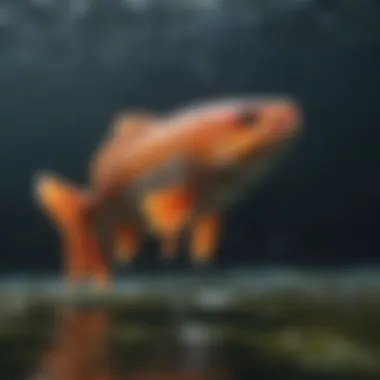Unveiling the Intriguing Relationship Between Fish Feeding Habits and Growth


Water Activity Overview
Fish growth through feeding habits is a captivating journey into the underwater world. Just like surfers gliding on ocean waves or sailors navigating vast seas, fish embark on their own unique expedition of development. Much like snorkelers exploring the depths of the sea or paddleboarders cruising along tranquil waters, fish growth is intricately tied to their feeding habits. By understanding how these habits influence their size and overall development, we unravel the mysteries of fish growth in an aquatic universe of wonders.
Tips and Techniques
For beginners in the realm of fish growth, it is essential to grasp the fundamental principles of feeding habits. Just as experienced water enthusiasts employ advanced techniques to enhance their skills, fish enthusiasts can optimize feeding strategies for maximum growth potential. Safety guidelines are crucial in both water sports and fish care, ensuring a nurturing environment for fish to thrive and reach their full genetic potential.
Gear Reviews
Much like surfers rely on well-crafted surfboards and sailboat enthusiasts on sturdy vessels, fish enthusiasts benefit from suitable feeding equipment. From specialized fish feed to automated feeding systems, having the right gear is essential in promoting healthy growth and development. Just as snorkelers require quality equipment for underwater exploration, fish rely on nutritious feed to fuel their growth journey. Wetsuits may protect water sports enthusiasts, but optimal feeding gear safeguards the well-being and vitality of fish.
Destination Guides
In the vast expanse of aquatic environments, certain locations stand out as popular hubs for fish growth and development. These areas provide ideal conditions for fish to thrive, offering a plethora of nutritional resources vital for their well-being. Much like hidden gems appeal to water sports enthusiasts seeking unique experiences, specific feeding grounds hold the key to unlocking the full growth potential of fish. Travel tips for fish keepers mirror those for water sports trips, emphasizing preparedness, caution, and a deep appreciation for the wonders of the underwater world.
Exploring the Relationship Between Fish and Nutrition
In this segment of the article, we delve into the intricate connection between fish and nutrition, a fundamental aspect that profoundly influences their growth trajectory. Understanding the significance of nutrition is paramount in grasping the underlying mechanisms driving optimal fish development. By delving into the specific elements that constitute a fish's diet, we can unravel the essential components necessary for fostering robust growth and vitality.
The Importance of Nutrition in Fish Growth
Evaluating the Role of Nutrition in Supporting Fish Growth
When evaluating the role of nutrition in bolstering fish growth, we are confronted with a critical aspect pivotal in determining the overall health and well-being of aquatic species. Through a meticulous analysis of the nutrients present in their diet, we can discern the intricate balance required to support vigorous growth patterns. The key characteristic of this evaluation lies in its ability to identify and address any nutritional deficiencies that may impede the growth potential of fish. By shedding light on the specific dietary requirements crucial for sustained development, this exploration becomes a cornerstone in optimizing fish growth within various aquatic environments.
Understanding the Key Nutrients Essential for Fish Development


In comprehending the key nutrients essential for fish development, we unravel the precise components that serve as building blocks for their growth and vitality. By highlighting the significance of proteins, fats, and carbohydrates in their diet, we gain insight into the specific roles these nutrients play in fostering robust development. The key characteristic of understanding these essential nutrients lies in their ability to fuel metabolic processes essential for cellular growth and renewal. However, it is crucial to recognize that an imbalance in these nutrients could potentially hinder growth, emphasizing the delicate equilibrium required for sustaining optimal fish development.
Impact of Feeding Habits on Fish Size
Analyzing How Different Feeding Habits Affect Fish Growth
The exploration into how different feeding habits influence fish growth unravels a complex interplay between dietary patterns and size enhancement. By scrutinizing the various feeding habits adopted by different fish species, we can draw correlations between specific diets and their impact on growth rates. The key characteristic of this analysis lies in its ability to elucidate the direct relationship between feeding behaviors and the development of fish size. Understanding the nuances of these feeding habits provides invaluable insights into optimizing feeding strategies to maximize growth potential while ensuring the overall well-being of aquatic populations.
Exploring the Correlation Between Food Intake and Fish Size
By investigating the correlation between food intake and fish size, we uncover a fundamental link between dietary consumption and physical dimensions. The key characteristic of this exploration lies in its ability to delineate how varying levels of food intake directly influence the growth patterns of fish. By comprehending the intricate relationship between nutritional intake and size increments, we gain a deeper understanding of the mechanisms governing fish development. However, it is essential to navigate the fine line between adequate nourishment and overfeeding, ensuring a delicate balance that promotes healthy growth without compromising the overall health and vitality of aquatic organisms.
Unraveling the Mechanisms Behind Fish Growth
In this section, we delve deep into the mechanisms that govern the growth of fishes, shedding light on the intricate processes that drive their development. Understanding these mechanisms is crucial for anyone seeking to optimize fish growth through feeding habits. By exploring the nutritional requirements and various factors influencing growth, we aim to provide a detailed roadmap for ensuring healthy and sustainable development in aquatic environments.
Nutritional Requirements for Fish Development
Examining the Specific Dietary Needs of Various Fish Species
Delving into the world of fish nutrition, it becomes evident that different species have unique dietary requirements essential for their growth and well-being. Examining these specific needs not only highlights the diversity within aquatic ecosystems but also underscores the importance of tailored feeding practices. By understanding the specific dietary preferences of various fish species, aquaculturists can ensure optimal health and growth rates, promoting overall productivity.
In the realm of fish growth, considering the dietary needs of different species is paramount. Certain fish species may require higher protein levels, while others thrive on a diet rich in fats or carbohydrates. This tailored approach to nutrition allows for customized feeding regimens that cater to the individual requirements of each species, maximizing growth potential and vitality.
Discussing How Protein, Fats, and Carbohydrates Contribute to Growth
Proteins, fats, and carbohydrates play integral roles in the growth and development of fishes. Protein is essential for muscle growth and repair, contributing to overall body mass. Fats serve as concentrated energy sources, vital for sustaining metabolic functions and promoting growth. Carbohydrates, while often less emphasized, provide quick bursts of energy required for activities such as swimming and chasing prey.
Understanding how these macronutrients interact within the fish's diet is key to fostering optimal growth. Balancing protein, fats, and carbohydrates ensures a well-rounded nutritional profile that meets the specific needs of each fish species. By delving into the nuanced roles of these nutrients, aquaculturists can craft diets that promote robust growth and wellness in their aquatic populations.


Factors Influencing Fish Growth Rate
Exploring Environmental Factors That Impact Fish Growth
The environment plays a pivotal role in shaping the growth trajectories of fishes. Factors such as water temperature, oxygen levels, and habitat quality directly influence fish growth rates. Optimal environmental conditions promote healthy metabolic functions and physiological processes, fostering accelerated growth and development.
When exploring the impact of environmental factors on fish growth, it is essential to consider the interconnected nature of aquatic ecosystems. Changes in one aspect, such as water quality or temperature, can have cascading effects on fish populations. By analyzing these environmental variables, aquaculturists can proactively adjust husbandry practices to create an optimal growth environment for their fish stocks.
Understanding Genetic Influences on the Growth Potential of Fish
Genetics plays a fundamental role in determining the growth potential of fish species. Inherent genetic traits influence factors such as growth rate, size, and disease resistance. By understanding the genetic makeup of different fish populations, breeders can selectively enhance desirable traits, propelling growth and productivity.
In the realm of aquaculture, leveraging genetic insights can lead to significant advancements in fish growth and health. By honing in on favorable genetic markers and traits, aquaculturists can streamline breeding programs to yield robust, fast-growing fish stocks. This intersection of genetics and growth offers a promising avenue for enhancing productivity while maintaining the genetic diversity essential for sustainable aquaculture practices.
Optimizing Fish Growth Through Strategic Feeding Practices
Balanced Diets for Maximum Growth Potential
Designing nutritionally balanced diets to promote fish growth:
Within the tapestry of fish growth optimization, the design of nutritionally balanced diets emerges as a cornerstone of success. By meticulously crafting diets rich in essential nutrients, fish health and growth are promoted to their fullest potential. The key characteristic of this approach lies in its ability to cater to the specific dietary needs of different fish species, ensuring that each receives the nourishment required for robust development. This strategy's unique feature is its precision in meeting fish nutritional requirements, which not only fuels growth but also enhances overall well-being. While discussing the advantageous nature of balanced diets, it's vital to acknowledge the careful balance required to avoid potential drawbacks such as excess nutrient buildup, which could impact water quality and fish health.
Implementing feeding schedules to enhance growth efficiency:
Another vital aspect of optimizing fish growth revolves around the implementation of feeding schedules to enhance growth efficiency. By establishing structured feeding routines, fish consumption rates can be optimized, leading to more efficient nutrient absorption and utilization. The key characteristic of this approach is its ability to prevent overfeeding or underfeeding, ensuring that fish receive the right amount of food at the right times. This careful coordination not only promotes growth but also minimizes wastage, contributing to sustainable aquaculture practices. However, it's essential to recognize that the unique feature of feeding schedules also requires careful monitoring to prevent potential imbalances or disruptions that could hinder growth outcomes.
Utilizing Feed Conversion Ratios for Growth Monitoring


Measuring feed conversion ratios to track fish growth progress:
When delving into the realm of growth monitoring, the measurement of feed conversion ratios emerges as a powerful tool. By calculating the efficiency of converting feed into fish biomass, farmers can gain valuable insights into growth trends and feeding performance. The key characteristic of this method is its ability to quantify the relationship between feed input and fish output, enabling informed decision-making to fine-tune feeding strategies. The unique feature of feed conversion ratios lies in their capacity to offer real-time feedback on growth progress, allowing for timely adjustments to optimize feeding practices. While discussing the advantages of this monitoring approach, it's important to remain vigilant against inaccuracies or variations that may impact the reliability of growth indicators.
Optimizing feeding strategies based on growth rate indicators:
Complementing the use of feed conversion ratios is the practice of optimizing feeding strategies based on growth rate indicators. By closely monitoring fish growth trajectories, farmers can adjust feeding regimes to align with specific growth targets and performance benchmarks. The key characteristic of this approach is its responsiveness to changing growth dynamics, allowing for adaptive feeding interventions to maximize growth potential. The unique feature of optimizing feeding strategies based on growth rate indicators lies in its tailored approach, which considers individual fish needs and growth patterns. While highlighting the advantages of this strategy, it's crucial to acknowledge the need for consistent data collection and analysis to ensure accurate adjustment of feeding protocols for sustained growth enhancement.
Realizing the Potential of Fish Growth in Aquaculture
In the world of aquaculture, realizing the potential of fish growth stands as a paramount focus for practitioners and enthusiasts. This section delves into the pivotal role of this subject within the broader context of fish development. Understanding how to optimize growth in a controlled environment is key to the sustainability and success of aquaculture ventures. By exploring innovations and challenges, we shed light on the complexities and opportunities inherent in nurturing fish for commercial or conservation purposes.
Innovations in Feeding Techniques for Aquaculture
When examining advancements in feed formulations for aquaculture, attention is drawn to the evolution of nutrition strategies in fish farming. This subsection scrutinizes the specific methods and ingredients that drive progress in optimizing fish diets for growth and health. Highlighting how these formulations enhance fish development, we uncover the nuances that make certain approaches more effective than others. Through a detailed exploration of feed components, we uncover the science behind creating balanced and nutritious meals for aquatic species.
Examining advancements in feed formulations for aquaculture
The meticulous examination of advancements in feed formulations unravels a realm of scientific precision within aquaculture practices. This segment sheds light on the groundbreaking approaches and formulations that redefine how we nourish fish populations. By dissecting key characteristics of modern feeds, we unveil the rationale behind their selection and application in enhancing fish growth. Furthermore, the unique features of these formulations offer insights into their advantages and potential limitations when integrated into aquaculture settings.
Integrating technology-driven feeding systems for optimal growth
Integrating technology-driven feeding systems marks a significant leap forward in optimizing fish growth potential. This section emphasizes the incorporation of technological innovations to streamline feeding processes and maximize efficiency. By highlighting the key attributes of these systems, we demonstrate their efficacy in promoting healthier and faster growth among aquatic species. However, it is essential to consider the advantages and disadvantages of such technologies within the scope of this article to provide a comprehensive view of their impact on fish development.
Challenges and Opportunities in Sustainable Fish Farming
Navigating the intricate landscape of sustainable fish farming unveils a tapestry of challenges and opportunities that shape the future of aquaculture. This section accentuates the need to address environmental concerns while striving for growth and profitability in fish production. By dissecting the obstacles and potential rewards of sustainable practices, we offer insights into how conservation efforts can synergize with commercial interests to create a harmonious ecosystem.
Addressing environmental concerns in fish farming practices
The meticulous focus on addressing environmental concerns underscores the ethical and practical considerations inherent in fish farming operations. This segment explores how industry players are adapting to mitigate ecological impacts while meeting the demand for aquatic products. Delving into the key characteristics of eco-conscious practices, we unravel why addressing environmental concerns is crucial for the long-term viability of aquaculture. Evaluating the advantages and disadvantages of such initiatives provides a holistic view of their role in the overarching goal of sustainable fish farming.
Exploring sustainable approaches to enhance fish growth while preserving ecosystems
The exploration of sustainable approaches introduces a paradigm of coexistence between growth and ecosystem preservation in fish farming. This subsection highlights innovative methods that seek to optimize fish development without compromising environmental stability. By emphasizing the unique attributes of sustainable practices, we elucidate why they are gaining traction in contemporary aquaculture. Evaluating the benefits and potential drawbacks of these approaches offers a nuanced understanding of their significance in promoting a healthy balance between productivity and environmental conservation.















